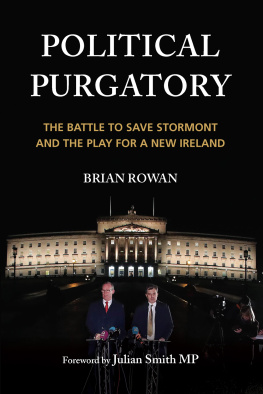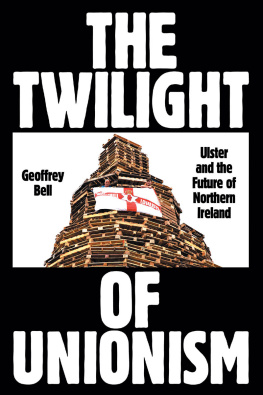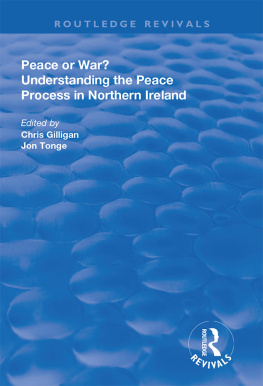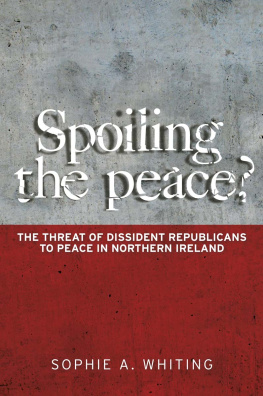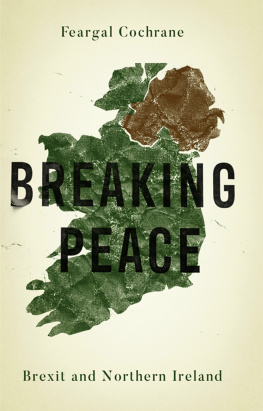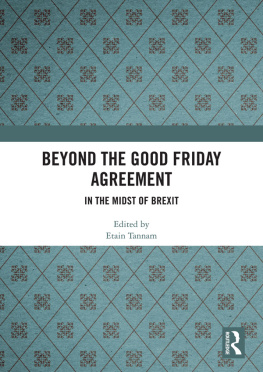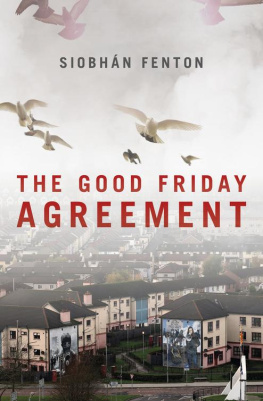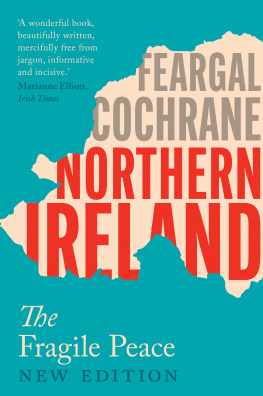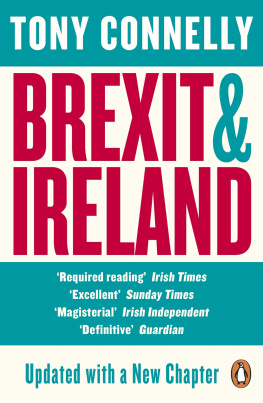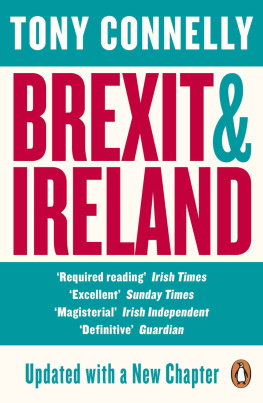
POLITICAL
PURGATORY
Veteran journalist Brian Rowan spent twenty-plus years of his career at the BBC in Belfast, including as a correspondent and security editor. In the Northern Ireland Press and Broadcast awards he was twice named Specialist Journalist of the Year as well as twice winning the online award. His 2005 book Paisley and the Provos was shortlisted for the Christopher Ewart-Biggs Memorial Prize, awarded to writers whose work promotes peace and reconciliation in Ireland. The late David Ervine a former UVF prisoner and Stormont MLA once described Rowan as having unrivalled access to all the protagonist groups.
POLITICAL
PURGATORY
THE BATTLE TO SAVE STORMONT
AND THE PLAY FOR A NEW IRELAND
BRIAN ROWAN

First published in 2021 by
Merrion Press
10 Georges Street
Newbridge
Co. Kildare
Ireland
www.merrionpress.ie
Brian Rowan, 2021
9781785373817 (Paper)
9781785373824 (Kindle)
9781785373831 (Epub)
A CIP catalogue record for this book is
available from the British Library.
All rights reserved. No part of this publication may be reproduced, stored in a retrieval system, or transmitted, in any form or by any means (electronic, mechanical, photocopying, recording or otherwise), without the prior written permission of both the copyright owner and the publisher of this book.
Typeset in Palatino 11/15 pt
Front cover: Winter theatre on the Stormont hill, January 2020. Tnaiste Simon Coveney and Secretary of State Julian Smith publish their New Decade, New Approach agreement in a move to restore the Executive. Image courtesy of Kelvin Boyes, Press Eye.
Back cover: Julian Smith with Sir Jonathan Stephens watching Sinn Fins response to the New Decade, New Approach agreement. Image courtesy of Ross Easton.
Merrion Press is a member of Publishing Ireland.
Contents
For Aoife Violet Rowan
Foreword
P olitical Purgatory details many of the recent chapters in Northern Ireland politics. It is a fascinating account of the period following the historic Good Friday Agreement including new theories as to why the two main parties fell out, bringing down the executive in 2017. For voters and ordinary citizens, the reality of that decision had real-life consequences for over three long years. Thankfully, Northern Irelands citizens were no longer faced with a daily diet of murder and terror the peace dividend was, by and large, maintained. But still political stasis saw over 300,000 women and men in Northern Ireland on health waiting lists and forced ordinary workers to look on as their representatives continued to be paid without representing them, despite the desperate need for political decisions.
In the context of a toxic mix of events, notably the murder of Lyra McKee, the Renewable Heat Incentive Scheme (RHI) scandal and the protracted Brexit process at Westminster, trust appeared totally lost between politicians. Moreover, a corrosive relationship had developed between those who were supposed to be governing and the ordinary voter. And by the end of 2019, politics was holding its citizens to ransom, not this time by fear or terror but by the reality of mandatory coalition and the continued ability of both main parties to veto Stormont returning. From mental health to childrens hospice provision, drain upgrades to broadband roll out, civil service reform to medical school places voters from either side of the constitutional debate were losing out compared to almost every other part of the UK. In particular, the value of the large additional per capita spend provided to Northern Ireland each year was lost in this depressing state of affairs.
This book outlines just how far trust had disappeared between each of the political parties during this period. It also makes clear that it was only after the passage of time, brutal elections for the main parties, a clear path on Brexit and an aggressive approach to resuscitating Stormont by the UK and Irish governments that the executive and assembly got re-formed. The lack of meaningful dialogue between the two main parties for much of the period and particularly in the run up to restoration in 2020 are a painful reminder of how fragile the system is and was to deteriorating relationships and the impact this has on citizens.
But this book also recognises how fortunate it was that the assembly and executive were restored and able to deal with the biggest challenge and crisis to hit the world in decades. Whilst there have been some major breaches of trust during 2020, by and large, the work this five-party executive has done to protect Northern Ireland over the Covid crisis has been well received. Having lain awake at night in anticipation of the potential impact of no deal combined with no executive in the run up to the then EU exit date of 31 October 2019, the impact of Covid without functioning government could have been catastrophic.
As Northern Ireland moves out of the first phase of the Covid crisis, there are big positives a more mature peace settlement, effective leadership to deal with the Covid crisis, progress on social issues like abortion and same-sex marriage and the victims pensions on their way. But there are many issues that were agreed in the New Decade, New Approach deal which still need to be delivered and these are vital for the long-term future of Stormont reforms of health, infrastructure and of the workings of the assembly. It is these genuine reforms that will build trust in the system. Above all, the UK and Irish governments and Northern Ireland parties agreed to work intensively to find a way of moving forward on the issue of the legacy of the past focused on families and victims. Dealing with the legacy of the past, of course, means different things to different people but there is now a real opportunity to find common ground, focused on bringing some form of resolution to the many families scarred by Northern Irelands decades of violence.
Whilst the turbulence of Brexit continues to leave major issues to be resolved, and Northern Ireland enters its centenary year, there are huge opportunities to renew and reinvigorate the Good Friday Agreement North/South and East/West bodies, to rebuild the economy post-Covid and to tackle the biggest global challenge climate change. With the UK taking the lead with Italy at the 2021 UN Climate Change conference in Glasgow, the EU investing billions in clean technologies and President Biden committed to bringing United States heft to the Climate Change challenge, there is a huge opportunity to create jobs and to deliver on the number one priority for the next generation. This is a reminder that while the constitutional debate will inevitably continue, there are many other things to get to work on meanwhile.
Julian Smith MP,
February 2021
Acknowledgements
W e live in the smallest of worlds. Before July 2020, I had never spoken with publisher Conor Graham. Yet, in those first words of our first conversation, I discovered a connection that dates back to the early 1970s, when we all lived in a very different place. It was a period when we as a family had to leave our home in east Belfast one of many families in the wrong place at that wrong time of conflict. Our escape was to Holywood, County Down and to a house that a very young Conor and his family had lived in up to then. When he mentioned his father Tonys name to me, I immediately made the connection. Conor has since spoken with his sisters, who remembered being asked by their mother on the day they were moving out of their house to leave some toys for the Rowan children. My wife Val was also a young friend of Conors eldest sister, Geralyn these just some of the dots that connect us in our small world.
Next page
